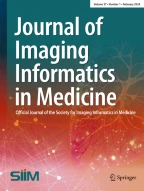Avoid common mistakes on your manuscript.
App Specs
App Name: Radiology Toolbox Pro
App Icon URL: https://itunes.apple.com/us/app/radiology-toolbox-pro/id466281848?mt=8
App Developer: Eric M. Baumel, MD and Softcode Systems, Inc.
App Developer Website: https://www.softcode.com/
App Price: $3.99 for Pro version. A free “Lite” version also exists
Apple App Store URL: https://itunes.apple.com/us/app/radiology-toolbox-pro/id466281848?mt=8
Google Play Store URL: Currently only available on iOS
Category: learning, radiological guidelines, calculator
Tags: radiology, iPad-compatible, guidelines
Works Offline: Yes
FDA Approval: N/A
Quick Review (1 star, lowest; 5 stars, highest)
Overall Rating (1–5): 4
Content (1–5): 4
Usability (1–5): 5
Pros: Easy access to useful and frequently called upon information. Simple menu with nice graphics.
Cons: Currently only available on iOS.
At a glance: This app provides easy access to information that most radiologists find themselves looking up several times throughout the day. It includes calculators, anatomy diagrams, diagnostic guidelines, follow-up guidelines and contrast dye information
Introduction
Radiology Toolbox Pro was developed with the everyday radiologist in mind. It provides relevant information for X-ray, CT, MRI, ultrasound and nuclear medicine. This app was developed by Eric Baumel, a Florida-based radiologist who like many found himself looking up the same information several times throughout the day. It provides easy access to useful information including calculators, anatomy diagrams, diagnostic guidelines as well as guidelines on the follow-up of indeterminate lesions.
Purpose/Features/Content
The main purpose of the app is to have information that is commonly searched by the everyday radiologist readily available at their fingertips thereby making their day-to-day practice more efficient. The app is available offline which means that the information is always available when needed.
Once the app is opened, users are greeted by a home menu with simple and attractive icons (Fig. 1). Each modality has a separate section and is depicted by its own cartoon graphic. These graphics are also available to download for use as emojis using the ‘Radiology Stickers’ app.
Some examples of useful features to highlight include a glomerular filtration rate (GFR) calculator that estimates GFR based on age, creatinine, sex and race (Fig. 2). A table providing information on the upper limits of normal-sized lymph nodes throughout the body was also particularly useful (Fig. 3) as well as the 2017 Fleischner Society guidelines on pulmonary nodule follow-up (Fig. 4) [1]. There are diagrams depicting the Salter Harris classification of fractures involving the epiphyseal plate found in the X-ray section (Fig. 5) [2], and extensor compartments of the wrist found in the MRI section (Fig. 6).
Usability
The app is easy to use with a simple layout. There is a separate section that provides information specific to each modality. There is a sidebar menu allowing easy transition from one section to another. The diagrams and tables in the app are high-resolution images that are amenable to ‘pinch-to-zoom’ making it easy to view.
Good
The app works well both on iPhone and iPad. Each section also has a ‘suggestions’ tab where users are invited to email ideas and suggestions to the app developers. There is also a short account of Wilhelm Röntgen’s work in 1895 which is a nice touch.
Room for Improvement
Some of the tables relating to guidelines are quite large and require the user to scroll down and/or zoom out to read each row. A section on radiation doses of each imaging study would be a nice addition as well as a ‘favourites’ section to store information that the user uses most often. At present, the app is only available on iOS, limiting it to iPhone and iPad users. It would be nice to develop the app for use with Android devices.
References
MacMahon H, Naidich DP, Goo JM, Lee KS, Leung AN, Mayo JR, et al.: Guidelines for Management of Incidental Pulmonary Nodules Detected on CT Images: From the Fleischner Society 2017. Radiology 161659, 2017
Salter R, Harris W: Injuries involving the epiphyseal plate. J Bone Joint Surg Am. 45(3):587–622, 1963
Author information
Authors and Affiliations
Corresponding author
Rights and permissions
About this article
Cite this article
Rahmani, G. Radiology Toolbox Pro App Review. J Digit Imaging 30, 661–664 (2017). https://doi.org/10.1007/s10278-017-9996-z
Published:
Issue Date:
DOI: https://doi.org/10.1007/s10278-017-9996-z
